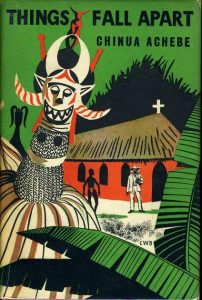
 Literature Guides
Literature Guides
Key Facts of Things Fall Apart
The bulk of the novel is set in a fictional village based on Achebe’s birthplace of Ogidi. His actual village comprised an Igbo-speaking people. This was a society of independent villages united under the legal authority of a counsel of elders.
Set in the 1890s, the events in the novel mirror the rapid transformation of Achebe’s own people and birthplace. The arrival of Christian missionaries in the 1890s saw a rapid fragmentation of the native customs and culture such that, by the 1930s when Achebe was born, the Igbo language and culture had largely been destroyed. In a span of approximately 50 years, western and European influence had managed to eradicate a complex native culture.
Chinua Achebe wrote the novel in English because he said the Igbo language consists of a combination of many dialects. It is not conducive to the novel form. In fact, the complexity of the Igbo language was a serious point of contention on the part of early missionaries in the area.
Considered the finest example of an African novel in English, Things Fall Apart is now read all over the English speaking world and in Africa. The novel has bridged the cultural divides by presenting a narrative that speaks to the African experience.
Achebe’s novel is considered the first literary work which expresses the colonial experience from the vantage point of the colonized people. Prior to Things Fall Apart, artistic representations of colonialism were all from the perspective of colonial powers.
The novel was first adapted into a radio play in 1961. It has since been made into a movie and a television miniseries.



